Discover It's Not About The Money
It's Not About The Money

It's Not About The Money
Author: Catherine Morgan
Subscribed: 420Played: 17,881Subscribe
Share
© @ Catherine Morgan Limited
Description
It’s not about the money is for women in business who know they want to make more money whilst holding onto more money and growing an abundance of wealth. You're tired of overgiving, undercharging and being stuck in a scarcity money mindset. You know you have it in you, you just need financial confidence and an abundant mindset. You're excited and ready to learn what it takes to make more money, invest and step into wealth. Hosted by Catherine Morgan, Author, Award-winning Financial Wellbeing Speaker, Financial Coach and Trauma-informed coach. You'll learn the steps to create more wealth, grow your business, and have a better relationship with money. This is the show for you to feel good with money and to explore the meaning beyond wealth. This podcast is the one to listen to if you're a female entrepreneur. ‘Formerly the In Her Financial Shoes Podcast.’
355 Episodes
Reverse
Have you ever achieved a major financial milestone - landed a big client, hit a revenue goal, or finally built up your savings - only to watch yourself systematically self-sabotage it within weeks? Maybe you suddenly took on underpriced work, made an impulsive expensive purchase, or created some drama that torpedoed your success. If this sounds familiar, I need you to understand something crucial: this isn't weakness, it's not a character flaw, and it's not lack of willpower. This is your nervous system literally treating financial success like a threat to your existence. Right now, thousands of people are searching terms like "why do I self-sabotage when things go well" or "why can't I hold onto money" because they're experiencing what I call success dysregulation - where your body cannot tolerate the feeling of having more, so it creates chaos to bring you back to the familiarity of struggle. Today, I'm diving into why you might be getting 80% of the way to your financial goals and then something just happens, and more importantly, how to rewire your nervous system so you can finally keep what you've created. Chapters 00:00 Understanding Financial Self-Sabotage 02:46 The Role of the Nervous System in Money Management 05:52 Success Dysregulation: The Fear of Holding Success 08:35 Patterns of Self-Sabotage in Financial Success 11:22 Exploring the Three Money Zones 14:00 Common Patterns of Financial Dysregulation 17:06 Somatic Practices for Financial Success 19:51 Rewiring Your Nervous System for Success 22:11 Creating a Safe Space for Financial Growth 25:12 The Journey Towards Financial Empowerment Resources: Get my FREE book 'It's Not About The Money' Take the Money StoryTypes® Quiz Sign up to my FREE Newsletter Become a Certified Financial Coach Get my FREE “5 Hidden Money Beliefs” Framework for Coaches. Take the '5 Hidden Money Beliefs + 3-Zone Self-Check' Download more resources at themoneypanel.co.uk/breakingmoneycycles
If you've ever caught yourself saying "I don't want to price myself out of the market" or felt that familiar guilt creeping in when considering raising your prices, you're about to discover why being the affordable option is actually a financial trauma response. The hidden cost of undercharging isn't just the money you're leaving on the table - it's the cycle of resentment, exhaustion, and trauma responses that keep you trapped in patterns of unworthiness. In my book "It's Not About The Money," I explore how under-earning often starts as a trauma response where we overwork to prove ourselves, yet still feel undeserving. Today, I'm diving into why you've learned that charging less keeps you safe from rejection, but what's really happening is that every time you undercharge, you're training your body to believe you're worth less. This belief doesn't just affect your pricing - it rewires how you show up in every area of your life, creating a perfect storm where all three money zones get hijacked simultaneously. Chapters 00:00 Understanding the Cost of Undercharging 03:14 Exploring the Three Money Zones 05:48 Identifying Symptoms of Under-Earning 09:43 The Impact of Money Trauma 14:08 Body Work and Emotional Connection 19:25 Shifting Perspectives on Pricing Resources: Get my FREE book 'It's Not About The Money' Take the Money StoryTypes® Quiz Sign up to my FREE Newsletter Become a Certified Financial Coach Get my FREE “5 Hidden Money Beliefs” Framework for Coaches. Take the '5 Hidden Money Beliefs + 3-Zone Self-Check' Download more resources at themoneypanel.co.uk/breakingmoneycycles
Have you ever looked at your bank account and thought "this should feel like enough," yet still felt that familiar knot of anxiety in your stomach whenever money came up? You're absolutely not alone in this experience. This week, I'm diving deep into why you can feel broke even when you have money - and it has nothing to do with the actual numbers in your account. The real culprit? Your nervous system and how it's been programmed to recognise what feels "safe" around money. If you grew up hearing "we can't afford that" or witnessed your parents stress about finances, your body has been encoded with those scarcity patterns, even if you're now financially secure as an adult. Today, I'm sharing the 10-minute daily practice that completely rewired my relationship with worthiness and abundance - because the truth is, you can't think your way out of feeling unworthy, you have to feel your way into a new reality. Chapters 00:00 Understanding Financial Anxiety 03:11 Breaking Money Cycles: The Three Money Zones 10:00 Emotional Freedom and Healing Practices 12:14 Heart Breathing: A Transformative Practice 23:52 Rewiring Your Relationship with Money Resources: Get my FREE book 'It's Not About The Money' Take the Money StoryTypes® Quiz Sign up to my FREE Newsletter Become a Certified Financial Coach Get my FREE “5 Hidden Money Beliefs” Framework for Coaches. Take the '5 Hidden Money Beliefs + 3-Zone Self-Check' Download more resources at themoneypanel.co.uk/breakingmoneycycles
In this deeply personal episode, I explore why having more money often doesn't make us feel safer, and why this isn't actually a money problem - it's a meaning problem. Drawing from my own experience of nearly losing my youngest son Thomas twice in his first five weeks of life, I reveal how our "not enough" programming around money often stems from our deepest fears about being unprepared when someone we love is at risk. Through my three-zone model of receiving, holding, and giving, I break down how these inherited money beliefs create an exhausting cycle where we work harder but can never earn, save, or give enough to feel truly secure - because the issue was never about the money itself, but the unconscious meanings we've attached to it. Chapters 00:00 Understanding the Meaning Problem with Money 03:09 Personal Story: A Life-Changing Moment 09:49 The Three Zone Model of Money Relationships 18:45 Exploring the Receiving Zone 25:04 Navigating the Holding Zone 26:16 The Challenges of the Giving Zone 35:48 Changing Money Patterns and Beliefs Resources: Get my FREE book 'It's Not About The Money' Take the Money StoryTypes® Quiz Sign up to my FREE Newsletter Become a Certified Financial Coach Get my FREE “5 Hidden Money Beliefs” Framework for Coaches.
In this episode, I'm joined by Chris Ducker, serial entrepreneur, founder of Youpreneur, and author of the brand new book "The Long-Haul Leader." Chris shares his deeply personal journey from building multi-seven figure businesses whilst burning himself out, to being diagnosed with phase three adrenal failure, depression, and anxiety all in the same day in 2021. What emerged from that breakdown was a complete reimagining of what sustainable success looks like - moving away from hustle culture towards what he calls "long-haul leadership." We explore his Life OS framework with its four key domains, why hobbies aren't frivolous but essential for productivity, and how Chris completely redefined his relationship with money from chasing it to using it as a tool for creating the life he actually wants to live. Chapters 00:00 Introduction to Long Haul Leadership 01:15 The Journey of Burnout and Recovery 03:52 The Impact of Relationships on Leadership 09:43 Exploring the Life Operating System Framework 17:05 The Importance of Hobbies and Personal Mastery 20:57 The Relationship with Money and Self 23:00 The Journey of Entrepreneurship 26:45 Redefining Success and Celebrating Milestones 27:19 Shifting Perspectives on Money Management 29:32 Understanding 'Enough' in Financial Terms 30:59 The Importance of Self-Care and Well-Being 34:21 Creating a Sustainable You Resources: Get my FREE book 'It's Not About The Money' Take the Money StoryTypes® Quiz Sign up to my FREE Newsletter Become a Certified Financial Coach Get my FREE “5 Hidden Money Beliefs” Framework for Coaches. Discover more about Chris Ducker at www.thelonghaulleader.com Hear How to Build Rich Relationships With Selena Soo Listen to The Big Leap and How We Upper Limit Ourselves with Gay Hendricks
Episode Overview In this episode, I'm joined by Alexis Kingsbury, a multi-entrepreneur who started his first business at just 12 years old, yet failed with six consecutive businesses throughout school and university. After being told by a management consultant that he'd "never be able to build a team" and having his first employee quit saying his company had "no culture, no processes and no proper ways of working," Alexis has gone on to build two successful software businesses and a consulting practice serving over 600 organisations worldwide, including Google, Sony and Pepsi. Most importantly, he's completely removed himself from day-to-day operations and regularly takes trips around Europe with his family. If you've ever felt trapped working in your business rather than on it, this conversation will completely change how you think about scaling sustainably. Chapters 00:00 Introduction to Business Freedom 02:44 Early Business Ventures and Lessons Learned 09:38 Mindset Shifts for Business Growth 15:12 The Importance of Enjoying the Journey 20:54 Building a Business That Runs Without You 29:05 Hiring the Right People for Growth 40:11 What Matters Beyond Money Resources: Get my FREE book 'It's Not About The Money' Take the Money StoryTypes® Quiz Sign up to my FREE Newsletter Become a Certified Financial Coach Get my FREE “5 Hidden Money Beliefs” Framework for Coaches. Discover AirManual Listen to the De-stress Your Business podcast
Episode Overview In this episode, I'm delighted to chat with Michelle Taylor, founder of Women in Wealth and host of the "Talk Wealthy to Me" podcast, who shares her incredibly powerful and vulnerable money story. From growing up with two parents who had completely opposite approaches to money, to being diagnosed with leukaemia at 17, to finding herself unable to buy a magazine at the airport because four credit cards were declined - Michelle's journey is a masterclass in resilience and financial transformation. Her story beautifully illustrates how our early money experiences shape us, and more importantly, how we can rewrite our financial narrative at any stage of life. Chapters 00:00 Empowering Women in Wealth 02:39 Michelle's Early Money Experiences 06:29 Overcoming Adversity: The Impact of Illness 11:08 Lessons from Financial Struggles 18:16 Building Resilience Around Money 19:52 Setting Financial Goals and Mindset 23:32 Common Mistakes Entrepreneurs Make 26:20 Finding Your Support System 31:02 Final Thoughts: Betting on Yourself Resources: Get my FREE book 'It's Not About The Money' Take the Money StoryTypes® Quiz Sign up to my FREE Newsletter Become a Certified Financial Coach Get my FREE “5 Hidden Money Beliefs” Framework for Coaches.
In this episode, I share a powerful story about a well-known financial celebrity who, despite decades of expertise and clear logical reasons, had been putting off the same property purchase for almost 20 years. What we discovered in our conversation reveals everything about why you might be undercharging, avoiding money conversations, or sabotaging your financial success - and it's not what you think. Through my seven-day money story discovery process, I'll show you how to uncover the hidden inherited survival strategies that have been passed down through three generations, affecting every financial decision you make, even when you logically know better. Chapters 00:00 Understanding Money Fears and Patterns 13:12 The Seven-Day Money Story Discovery Process Resources: Get my FREE book 'It's Not About The Money' Take the Money StoryTypes® Quiz Sign up to my FREE Newsletter Become a Certified Financial Coach Watch 'The Invisible Money Scripts Sabotaging Your Success (And How to Rewrite Them)' Get my FREE “5 Hidden Money Beliefs” Framework for Coaches.
In this episode, I'm delighted to chat with Jason Graystone, author of "Always Free" and investor who achieved financial freedom at just 30 years old. Jason and I actually met on a ski trip with Daniel Priestley earlier this year, and I couldn't resist having him on the show to discuss his remarkable journey from hiding behind the sofa as bailiffs knocked on the door in his childhood council estate, to building a half-million subscriber YouTube channel and living completely financially free on his West Sussex farm. We dive deep into why most people never achieve financial freedom, the psychology of money, trading strategies, and what true freedom really means when it's not about the money. Chapters 00:00 Introduction to Financial Freedom 02:59 Jason's Early Influences and Money Mindset 05:47 The Journey to Financial Security 09:02 Understanding Freedom: Emotional vs. Financial 11:53 The Impact of Childhood Experiences on Financial Views 14:56 Work Ethic and Its Influence on Freedom 18:10 Sacrifices Made for Financial Freedom 21:07 Transitioning to Trading and Entrepreneurship 23:52 Building a Community and Sharing Knowledge 26:00 The Journey of Learning to Trade 28:58 Navigating Emotions in Trading 36:18 Key Skills for Successful Trading 40:11 Investment Strategies and Risk Management 48:36 Finding Freedom Beyond Money Resources: Get my FREE book 'It's Not About The Money' Take the Money StoryTypes® Quiz Sign up to my FREE Newsletter Become a Certified Financial Coach Join The Energy of Selling Join Female Financial Foundations using discount code FFF47 (saving £750) for the first 500 people
In this comprehensive masterclass episode, I share everything I learned during my 15 years working inside banks as a trained financial adviser, watching thousands of intelligent people convinced they weren't good with money. After discovering that you don't need to be rich to get started, don't need financial qualifications, and definitely don't need to love numbers to build wealth like the top 1%, I'm pulling back the curtain on the complete system that's helped thousands break free from financial stress. This is your complete guide to transforming your relationship with money - covering both the practical strategies and the psychology that banks don't want you to know about - regardless of your starting point. Chapters 00:00 Understanding Money and Wealth Building 12:31 Rewriting Your Money Story 19:31 Creating a Debt Freedom Plan 27:52 Setting Motivating Financial Goals 38:51 Establishing a Weekly Money Routine 45:33 Monthly Financial Focus and Adjustments 54:49 The Importance of Starting to Invest 01:01:06 Investment Strategies Across Life Stages 01:11:22 Psychology of Money and Saving Techniques 01:20:34 Transforming Your Relationship with Money 01:21:33 The Female Financial Foundations Course Overview 01:22:56 Exclusive Course Offer and Bonuses Resources: Get my FREE book 'It's Not About The Money' Take the Money StoryTypes® Quiz Sign up to my FREE Newsletter Become a Certified Financial Coach Join The Energy of Selling Join Female Financial Foundations using discount code FFF47 (saving £750) for the first 500 people
Episode Overview In this episode, I'm delighted to chat with bestselling author and visibility expert Selena Soo about her incredible book "Rich Relationships." After following Selena's work for years and witnessing the transformative results her expertise creates, I dive deep into her revolutionary approach to building, nurturing, and activating your million-dollar network. We explore how rich relationships - those that massively enrich the quality of your life - are truly the fastest way to get from where you are to where you want to be, especially in today's economy where trust is at an all-time low and authentic connections can take you places that mass marketing simply cannot. Chapters 00:00 Introduction to Rich Relationships 04:27 Defining Rich Relationships 06:03 The Six Circles of Connection 10:59 Navigating Relationships and Self-Assessment 18:09 Breaking Unhealthy Relationships 23:25 Navigating Relationships and Personal Growth 29:14 Building Your Top 40 Relationships 35:42 The Art of Giving and Receiving in Relationships Resources: Get my FREE book 'It's Not About The Money' Take the Money StoryTypes® Quiz Sign up to my FREE Newsletter Become a Certified Financial Coach Join The Energy of Selling Read Selena's Rich Relationships Scripts Listen to The Future Of Money and AI With Natalie MacNeil podcast episode Discover the the Linkedin Accelerator course I did
In this episode, I tackle one of the biggest challenges facing business owners today: working 50-70 hours a week but still lying awake wondering where all the money has gone. Through a real client case study and practical strategies, I reveal why being busy isn't the same as being profitable, and share the three fundamental ways to transform your hard work into actual profit that pays you properly. Chapters 00:00 The Busy vs. Profitable Paradox 02:45 Understanding Profit Confusion 06:07 Designing Your Life for Profit 09:13 The Importance of Knowing Your Financial Needs 12:06 Time and Energy Management for Profit 14:55 The Power of Mindset in Profitability 17:46 Strategies to Increase Profit 21:04 Decreasing Costs Effectively 23:56 Mindset Shifts for Financial Success Resources: Get my FREE book 'It's Not About The Money' Take the Money StoryTypes® Quiz Sign up to my FREE Newsletter Become a Certified Financial Coach Join The Energy of Selling
In this episode, I chat with the incredible duo behind Bucket List Bombshells - Cassie and Shay - who met serendipitously in a Mexican coffee shop after both quitting their corporate jobs with one-way tickets. Together, they've built a freedom-based, service-based business generating over £4.5 million in revenue whilst serving thousands of women worldwide. We dive deep into their contrasting money relationships, the power of visionary-integrator partnerships, and the lessons learned from scaling sustainably. Episode Highlights: The Coffee Shop Origin Story - 2013 How both women independently decided corporate wasn't their dream and quit their jobs for one-way tickets to Mexico Meeting in a Playa del Carmen coffee shop through a mutual friend The early question that shaped everything: "What does the dream life look like for us?" Building a business around the life they wanted to live, not the other way around How having a mentor with an online business provided a blueprint for possibility The Contrasting Money Relationships in Partnership Shay's Journey (The Integrator): Fast money growth creating challenges with holding wealth and abundance Spending money as quickly as it came in during early success phases Shiny object syndrome and following other successful entrepreneurs without understanding their mechanics Identity becoming tied to daily revenue numbers and success/failure cycles Learning to separate self-worth from business metrics Now finding joy in CEO dashboards and empowering clients with financial clarity Cassie's Journey (The Visionary): "Ignore the numbers and work harder" mentality from early conditioning Type A personality believing harder work = more money Leading to burnout from constantly doing more: more offers, more team, more marketing Going from 25 different offers to just one at their simplification point Learning that scaling comes from amplifying what works, not adding complexity Essential Financial Metrics Every Business Owner Should Track Lead Generation Numbers: How many leads monthly from each source (word of mouth, Instagram, networking) Lead to Sales Call Conversion: Aiming for baseline 50% conversion rate Sales Call Conversion Rates: Most entrepreneurs guess these numbers rather than tracking accurately Revenue vs. Profit Focus: Focusing on profit margins rather than just revenue figures Paying Yourself First: Fixed salary approach rather than percentage-based payments to create stability The Simplification Revolution - From 25 Offers to 3 How complexity became the enemy of clarity and growth The realisation that confused minds don't buy and confused CEOs don't lead well Discovering that more offers don't equal more money Learning to say "not right now" to opportunities and creative ideas The power of channelling creativity outside the business through art classes and hobbies Key Business Philosophy Shifts Business as a Marathon, Not Sprint: Recognising different seasons in business and life Moving away from "always more" mentality toward sustainable growth Understanding that there's never enough when the goal is always more Finding peace through stepping back, scaling back, and simplifying Creative Boundaries for Visionaries: Not asking the business to serve all creative needs Finding outlets for creativity outside revenue-generating activities Understanding the difference between one-time creative pursuits and sustainable business offers Focusing on refinement and consistency rather than constant new launches Partnership Dynamics and Communication The importance of communicating when things don't feel aligned Learning to trust yourself again after perceived failures Not assuming your partner shares the same passion and vision at all times The breakthrough that comes from honest communication about misalignment How addressing issues strengthens both partnership and connection to vision Practical Tools and Strategies The Buyer Persona Deep Dive: Going beyond surface-level target audience work Understanding dream clients down to what car they drive and podcasts they listen to Using real client emails and call language to refine messaging Leveraging AI tools like ChatGPT with detailed buyer personas for better content creation Using sales call transcripts to analyse money mindset blocks and selling patterns Financial Stability Creation: Creating business financial stability that supports desired lifestyle Implementing profit-first principles with fixed salaries Quarterly bonus structure similar to traditional employment Removing the emotional roller coaster of percentage-based payments Final Thought True freedom in business comes not from doing more, but from simplifying and amplifying what works whilst building around the life you actually want to live. Success is sustainable when you understand your natural strengths, communicate openly with partners, and create systems that support both financial growth and personal fulfilment. Chapters 00:00 Celebrating Milestones and New Beginnings 00:55 The Journey to Entrepreneurship 02:19 The Coffee Shop Connection 05:55 Defining the Dream Life 10:40 Navigating Money Mindset 16:05 Data-Driven Decisions in Business 21:15 Understanding Key Financial Metrics 26:03 Balancing Vision and Numbers 32:49 Advice for Future Entrepreneurs 43:39 Communicating Needs in Partnerships 48:46 Free Resources for Entrepreneurs Resources: Get my FREE book 'It's Not About The Money' Take the Money StoryTypes® Quiz Sign up to my FREE Newsletter Become a Certified Financial Coach Join The Energy of Selling Take the Bucketlist Bombshells Buyer Persona & Brand Messaging Questionnaire Listen to The Future Of Money and AI With Natalie MacNeil podcast episode
In this vulnerable episode, I share the untold story behind hitting £50,000 months and how success nearly broke me mentally, emotionally, and physically. Rather than celebrating these income milestones, I reveal the shame, overwhelm, and toxicity that comes with scaling without boundaries - and the complete business transformation that saved my sanity. The Moment That Changed Everything - Summer 2023 How my mum discovering my £50K bank statement triggered intense money shame The guilt of making money "easily" when others, including my mum, had to struggle My immediate response: dismissing it as a "one-off" rather than owning my success The realisation that my nervous system was rejecting wealth because it felt dangerous to have more than people I love The Reality Behind the Success - What Nobody Talks About Running 15 different courses and offerings simultaneously: mini courses, evergreen programmes, books, podcast, workshops, membership, certification, mastermind, pensions course, investing course, budgeting course The overwhelming complexity of multiple revenue streams running at once How my two biggest profit generators (12-month mastermind and signature money programme) required constant client acquisition The crushing responsibility of paying team wages on top of my own income The Neurodivergent Entrepreneur's Dilemma How my 2023 ADHD diagnosis explained my love of creating and my overwhelm with complexity The creativity trap: what was joyful and easy became my kryptonite Why neurodivergent brains struggle with "more" - the million pieces of information running simultaneously The toxic scaling trap fuelled by online business gurus pushing "make more, hire bigger teams, create more products" My Great Simplification Journey - What I Actually Did Taking August 2024 completely off (with a separate episode on how to do this) Pausing my podcast for five months - the first break in five years Closing my mastermind (biggest income generator) and stopping launches for my second biggest programme Letting go of a key team member and hibernating whilst travelling Canada with my family The breakthrough conversation with Richard Branson on Necker Island about his circle analogy The Rule of Five Framework for Overwhelmed Entrepreneurs One target market - you can't serve everybody without serving nobody One problem solved - going deep rather than wide, partnering with others for different solutions One offer - mastering one thing completely rather than multiple offerings One platform - I chose LinkedIn and became top 30 money content creator in UK within 90 days One year - committing to this focus for 12 months without wavering My Personal Implementation Story Returning to my core: financial coach training for professionals wanting to help clients with money Focusing on my Money Narrative Clearing Framework as the one thing with biggest impact Investing in LinkedIn mastery course and achieving top 30 UK money creator status Four speaking opportunities in 90 days, including one at the O2 Stripping back to part-time PA and couple of VAs only The Financial Permission I Gave Myself Living off investments and savings for a year to remove financial pressure Paying myself from savings pots rather than staying in constant launch mode Overcoming stories about "wealth experts should be making loads of money consistently" Understanding my numerology: coming out of year 9 (completions/letting go) into year 1 (new beginnings) and now year 11 (spiritual teacher/volatile emotions) The Success Lessons Nobody Teaches You Success Can Be Lonely: How entrepreneurship isolates you from meaningful connections Making 2025 my "year of relationships" - every decision based on improving relationships with self, others, and business collaborations Success Trauma Is Real: How your nervous system can interpret success as danger Generational money patterns affecting permission to hold wealth The need to heal success trauma before scaling Complexity Is the Enemy of Clarity: More offers don't equal more money - confused minds don't buy Confused CEOs don't lead well The power of saying "not right now" to ideas and opportunities Creativity Needs Boundaries: Visionaries need creative outlets outside their business The danger of relying solely on business for fulfilment and joy What happens when you want to sell or retire - preparation for life beyond business Neurodivergent Entrepreneurs Have Different Rules: Traditional business models can be harmful to neurodivergent brains Building business around family priorities and personal energy patterns Working 9-3, no evening webinars, extended wind-down time for nervous system regulation Where I Am Now - The Results of Simplification Significantly more space in my calendar and less stress Lower revenue but exponentially more joy and fulfilment Two focused businesses: UK financial coach training, Jersey personal brand with one container (Energy of Selling mini-mastermind) Smaller, happier, more focused team with better time freedom Dramatically improved mental health and expanded relationships Recognition that wealth is built on focus, not complexity Practical Action Steps for Overwhelmed Entrepreneurs Audit your offerings - what can you cut that's not bringing joy or revenue? Check your nervous system - is success feeling safe? Address money stories holding you back Apply the Rule of Five - where can you simplify across all five areas? Honour your neurodivergence - what actually works for your brain and energy? Redefine success - give yourself permission to prioritise wellbeing over revenue Final Thought This episode emphasises that real wealth isn't just about the money you make - it's about the life you get to live whilst making it. If your success is costing you your sanity, it's time to redefine what success looks like and feels like. My £50K months didn't make me happier; they just made me busier. Chapters 00:00 - Introduction: The Reality of Financial Milestones 03:30 - The Shame of Success 08:00 - The Toxicity of Scaling 14:00 - The Great Simplification 20:00 - The Rule of Five Framework 26:00 - Honoring Neurodivergent Needs 32:00 - Redefining Success Resources: Get my FREE book 'It's Not About The Money' Take the Money StoryTypes® Quiz Sign up to my FREE Newsletter Become a Certified Financial Coach Join The Energy of Selling Discover the the Linkedin Accelerator course I did Listen to What I learnt from Sir Richard Branson
In this episode, I explore why we get stuck repeating the same frustrating money patterns despite reading books, listening to podcasts, and working on our mindset. Rather than blaming ourselves for being broken or lazy, I reveal the hidden psychology behind these behaviours - the secondary gains that keep us "stuck" because they're actually protecting us in some way. Episode Highlights: Understanding Secondary Gains - The Hidden Benefits How every financial behaviour, even destructive ones, serves a positive purpose Why our unconscious mind creates patterns to keep us safe based on old information The concept of secondary gains as "wrapping" around our biggest fears about money How protection mechanisms that once served us may no longer be appropriate at 43 The difference between conscious desires and unconscious protective patterns My Personal Examples: Undercharging and Protection How I stayed in undercharging patterns to avoid rejection and confrontation The realisation that "you're too expensive" is about the other person's values, not my worth My Thermomix story - how I value different things differently (£800 kitchen gadget vs. high-ticket mentoring) The first-class flight dilemma and the guilt around spending £1,500 on comfort The Four Most Common Secondary Gains Around Money 1. Undercharging Pattern: Primary fear: rejection, confrontation, and loss of "nice person" identity Benefits: more people say yes, avoiding uncomfortable negotiations, staying accessible How it prevents claiming full power and owning your brilliance Applies to both business owners and employees negotiating pay rises 2. Chronic Saving Pattern: Primary fear: uncertainty and lack of control Benefits: feeling protected, being the "responsible one," avoiding buyer's remorse How it maintains identity as the sensible person while others are "frivolous" The trap of "never enough" despite growing bank balances 3. Money Avoidance Pattern: Primary fear: adult responsibility and making wrong decisions Benefits: maintaining childlike innocence, having others take responsibility How chaos becomes an excuse to avoid goal-setting and risk-taking Case study from my recent live coaching demonstration about staying in childlike patterns 4. Overspending/Impulse Pattern: Primary fear: making big decisions and planning ahead Benefits: instant emotional regulation, dopamine hits, maintaining victim identity How it helps avoid future planning (especially challenging for neurodivergent brains) My personal pattern of spending everything to avoid making financial decisions The Identity and Relationship Dynamics How money patterns serve our relationships and keep peace Client examples: fear of out-earning mentors, maintaining marriage dynamics The "struggling artist" or "survivor" story identity How staying financially small can protect us from jealousy and judgment The secondary gain of maintaining harmony by not threatening others' positions Spotting Your Own Secondary Gains - Key Questions What do you get to avoid when you stay stuck? What identity does this pattern allow you to maintain? How do your money patterns serve your relationships? What would you have to face if this pattern disappeared tomorrow? Does the possibility of change feel scary, and why? Working With Secondary Gains, Not Against Them The importance of curiosity over judgment How these patterns developed for good reasons and have been trying to protect us My approach using Emotional Freedom Technique (EFT) and Matrix Re-imprinting Combining somatic work with inherited family trauma modalities The goal: making your financial future more exciting than the secondary gain Practical Steps for Change Honouring what the pattern has done for you with gratitude Speaking directly to the protective parts: "Thank you for keeping me safe" Working with the nervous system through gradual, sustainable changes Finding healthy ways to meet the same emotional needs differently Why incremental price increases work better than dramatic jumps The Neurodivergent Perspective How ADHD and autism traits can make planning ahead feel unsafe Why spending everything now avoids future decision-making pressure Reference to previous episodes on managing money with ADHD protective mechanisms Chapters 00:00 Understanding Money Patterns and Secondary Gains 09:52 The Impact of Undercharging and Self-Worth 18:33 Exploring Chronic Saving and Money Avoidance 26:03 Transforming Patterns and Embracing Change Resources: Get my FREE book 'It's Not About The Money' Take the Money StoryTypes® Quiz Sign up to my FREE Newsletter Become a Certified Financial Coach Get Investing with my course - Use code INVEST50OFF2024 for 50% off as a podcast listener. Discover how to manage money when you have ADHD - watch a Live Money Clearing Financial Coaching demo video
My Personal Financial Adviser Paradox How I spent years giving brilliant financial advice whilst being unable to follow it myself Why excess money never felt safe to hold - everything above day-to-day needs felt dangerous The realisation that it wasn't about willpower, knowledge, or self-control How inherited beliefs about money scarcity and "dirty money" from family arguments shaped my nervous system responses Understanding Borrowed Beliefs - The Father Christmas Analogy Borrowed beliefs as gifts in Father Christmas's sack - given with love but not all serving us today How these beliefs often hold secondary gains and serve us in some way (usually safety) The importance of returning unused "gifts" with love and gratitude to break generational patterns Why changing our money relationship impacts every future generation Where Inherited Money Scripts Come From Family dynamics and early childhood experiences (my Warwick Castle story about my brother losing £20) Religious and cultural influences on money beliefs Specific historical events our families lived through Personal money experiences that create lasting impressions The crucial question: "In my family, money was..." The Three Predictable Patterns of Borrowed Beliefs Low Receiving Pattern: Difficulty allowing money, opportunities, or compliments to come in Common beliefs: "Rich people are greedy," "Money corrupts people," "I don't deserve money" Shows up as: undercharging, deflecting compliments, turning down opportunities, feeling guilty about success My personal example of struggling with praise and awards Low Holding Pattern: Brilliant at making money but terrible at keeping it Common beliefs: "Money disappears anyway," "Something bad happens when I have too much" Shows up as: impulsive spending after earning well, self-sabotage when successful, anxiety about bank balances Case study of my student hitting six-figure months then immediately booking lavish holidays Low Giving Pattern: Fear-based hoarding rather than conscious saving Common beliefs: "I can't afford to be generous," "If I give, there won't be enough for me" Shows up as: difficulty investing in yourself, anxiety about spending on others, perpetual "rainy day" saving The Family Money Tree Exercise How to map out your family's money patterns across generations Questions to explore: Was money talked about openly? Was it a source of arguments? Who controlled money? Common inherited phrases and their impacts: "Money doesn't grow on trees" = scarcity programming "Money's the root of all evil" = spiritual guilt around wealth "We can't afford it" = limitation mindset "Money doesn't buy happiness" = pacifist money story The Generational and Cultural Context How survival strategies from the Great Depression or wartime still influence us today Different cultural approaches to wealth - celebration vs. modesty Gender dynamics between maternal and paternal money influences The historical context that made these beliefs necessary for survival Conscious Choice and Legacy Work Recognising which beliefs served our families but no longer serve us The power shift from unconscious inheritance to conscious choice How this work creates transformation for coaches, therapists, and financial professionals The ripple effect of changing generational money patterns Final Thought This episode emphasises that changing our relationship with money isn't just personal work - it's legacy work that impacts every future generation. When we consciously choose which inherited beliefs to keep and which to lovingly release, we're not just transforming our own financial reality, we're changing the money story for generations to come. Chapters 00:00 Introduction to Money Beliefs 02:10 The Impact of Family Money Stories 05:25 Understanding Borrowed Beliefs 08:32 Identifying Personal Money Experiences 11:57 The Blueprint of Money in Families 17:00 Patterns of Money Behavior 22:24 Mapping Your Money Tree 29:44 Choosing New Money Beliefs Resources: Get my FREE book 'It's Not About The Money' Take the Money StoryTypes® Quiz Sign up to my FREE Newsletter Become a Certified Financial Coach Get Investing with my course - Use code INVEST50OFF2024 for 50% off as a podcast listener. Listen to the previous podcast episode - The Future Of Money and AI With Natalie MacNeil Listen to the previous podcast episode - How Digital Currency Is Rewiring Our Money Mindset
In this episode, I share insights from my recent interview with UK-based global company Agon about the crucial link between mental health and money. Rather than offering quick fixes, I explore the deeper emotional landscape beneath financial anxiety and provide six key questions to help you understand what's really driving your money worries Episode Highlights: Understanding the Root of Money Worries Money itself isn't usually what we're worried about - it's what money represents Common underlying fears: relationship security, business stability, lifestyle changes, and team obligations How financial anxiety often stems from deeper meanings we attach to money The difference between surface-level money concerns and their emotional foundations The Emotional Spectrum of Money My ladder metaphor: low-vibrational emotions at the bottom (shame, guilt, stress, anger) vs high-vibrational emotions at the top (gratitude, joy, happiness) Why jumping straight to gratitude practices doesn't work when you're experiencing financial shame The crucial middle step: acceptance of past decisions, inherited beliefs, and trauma patterns How the nervous system creates fight-or-flight responses to protect us from perceived financial threats The Complexity of Money Shame Why shame is the hardest emotion on the spectrum to shift How shame creates a freeze response in the nervous system, leading to financial avoidance Recognising shame through language: the "shoulds" we place on ourselves ("I should be good with money," "I should be further ahead") The importance of compassionate acknowledgement without judgement Money and Neurodiversity How traditional financial advice assumes neurotypical learning styles Specific challenges for neurodivergent individuals: impulse control, budgeting, long-term planning My personal ADHD experience: visual presentations, movement during money conversations, shorter but more frequent meetings The correlation between depression, anxiety, and financial avoidance Beyond Traditional Financial Solutions Why practical solutions (budgets, investment plans) don't work without addressing underlying emotions The problem with control-based planning when control doesn't feel safe How impulsive spending patterns can sabotage investment strategies if safety concerns aren't addressed The importance of understanding emotional patterns before implementing financial tools Professional Development for Coaches How coaches can support clients with money conversations without being qualified financial advisers The power of holding space for psychological exploration around money decisions Tools and frameworks for understanding the patterns behind financial behaviours My financial coach certification programme and free 40-minute training Final Thought This episode emphasises that healing our relationship with money requires understanding the emotional spectrum beneath our financial behaviours. Rather than bypassing difficult emotions to reach gratitude and joy, lasting change comes through accepting where we are, understanding our protective patterns, and working with our individual psychological makeup. Chapters 00:00 Understanding Money Worries and Emotions 06:11 The Emotional Spectrum of Money 12:43 Navigating Mental Health and Money Conversations Resources: Get my FREE book 'It's Not About The Money' Take the Money StoryTypes® Quiz Sign up to my FREE Newsletter Come to our Wealth Awakening Retreat Become a Certified Financial Coach Get Investing with my course - Use code INVEST50OFF2024 for 50% off as a podcast listener. Watch the FREE masterclass here Listen to The best way to plan your finances if you have adult ADHD Listen to How to Manage Money in Business When You Have ADHD Listen to (Money StoryTypes®) Money Shame & Emotional Spending listen to my 1 Way To Overcome Money Shame
Episode Overview In this follow-up episode to last week's conversation with Natalie MacNeil, I explore the psychological and emotional shifts required as we move into the digital currency era. Rather than focusing on technical aspects, this episode addresses the deeper questions about trust, safety, and completely rewiring how our brains think about money. Episode Highlights: The Physical vs Digital Money Mindset Our brains are hardwired to equate real money with tangible things we can hold and count Why Brits love property investing: it's "bricks and mortar" compared to US generations who prefer renting Digital currencies ask us to place value in mathematics and community consensus rather than government The challenge of trusting numbers on a screen that exist in cloud-based systems How our nervous system was designed to equate safety with things we can physically control Understanding Digital Currencies Simply Digital currencies as numbers stored on a huge shared computer network Unlike bank account numbers controlled by one institution, these are verified by thousands of computers worldwide Bitcoin as "digital gold" - limited in supply and designed to hold value Ethereum as a digital platform for building applications and communities The key difference: controlled by mathematics and community, not governments or banks The Generational Divide Personal story of 11-year-old son naturally gravitating toward digital wallets How younger generations view money as naturally existing "on a phone" Older clients who still prefer printed bank statements The comfort level with digital currencies often depends on how one grew up with technology The Great Trust Transfer Examining where we've been placing our trust: banks as the "safe option" The 2008 financial crisis and recent bank failures like Silicon Valley Bank COVID money printing diluting the value of every pound in bank accounts The psychological shift from "the bank will look after my money" to "I am my own bank" Why trusting ourselves feels riskier than trusting institutions that have failed us The Pearl Analogy from Gene Keys Richard Rudd's symbolism of the pearl as feminine metaphor for prosperity How pearls form from pressure and irritation, not perfection Wealth coming from responding with grace to challenges rather than ease Digital currencies as the "pearl" - transforming financial friction into something beautiful Moving from hoarding for ourselves to community and shared values Practical Steps for Building Confidence Using AI to create personalised learning courses about digital currencies Starting with 2-3% portfolio allocation to learn gradually The challenge of getting advice from traditional financial advisors due to regulatory constraints Beginning with small enough amounts to sleep at night but large enough to genuinely learn Treating it like learning any new skill - expecting a gradual comfort-building process Educational Resources Creating AI prompts to build beginner's guides tailored to individual situations Recommendation for Natalie McNeil's AI Dream Team course for entrepreneurs Catherine's book "It's Not About the Money" as foundational mindset work The Get Investing Course for beginner investors with 50% discount code INVEST50OFF2024 Final Thought This transformation is about trust, not technology. We're living through one of the biggest shifts in how humans relate to money since moving away from the gold standard. The key is giving yourself permission to start learning gradually and allowing your nervous system time to adjust, just as it did with online banking. Chapters 00:00 Rewiring Our Money Mindset 04:21 Understanding Digital Currencies 10:03 Generational Perspectives on Money 11:59 Trust and Financial Institutions 15:19 The Pearl Analogy: Transformation in Wealth 21:30 Practical Steps for Building Confidence 28:19 Trust Over Technology: A New Approach Resources: Get my FREE book 'It's Not About The Money' Take the Money StoryTypes® Quiz Sign up to my FREE Newsletter Come to our Wealth Awakening Retreat Become a Certified Financial Coach Discover how to screen your investment portfolio with an ethical lens Explore the AI Dream Team Course (Please note we are an affiliate for this course which means we may earn an affiliate commission for any purchases) I have personally invested and completed this course to help me save hours of time in my business. Download your AI Prompt Playbook Sign up to Natalie’s Weekly Newsletter Listen to podcast episode: Understanding your deep resistance to success through the lens of Gene Keys Get Investing with my course - Use code INVEST50OFF2024 for 50% off as a podcast listener.
In this forward-thinking episode, I'm joined by Emmy award-winning media entrepreneur and futurist Natalie MacNeil to explore the radical transformation of money happening before our eyes. From decentralised finance to community wealth-building, we dive deep into what the future holds for how we earn, save, and invest. The Dragonfly Metaphor Richard Rudd's story of the dragonfly as a metaphor for our current financial transformation Water nymphs living underwater with no concept of flying - representing our current understanding of money The biological impulse to climb up and transform into something completely different How we're about to experience a shift as dramatic as moving from water to flying through air From Individual to Collective Wealth The shift from individual wealth-building to community-focused financial systems How AI, robotics, automation, and blockchain will converge to change everything The "zero cost margin scenario" - when robots can produce almost everything for nearly free Why community and focusing on "being human" becomes crucial as machines replace human labour Decentralised Finance Revolution How fiat currency is backed by trust, not gold, creating vulnerability to government money printing The concept of being "your own bank" through decentralised finance Smart contracts replacing traditional intermediaries like bankers and lawyers Decentralised Autonomous Organisations (DAOs) returning power to communities Real examples already happening: Tesla robo-taxis that can work and earn money autonomously New Forms of Wealth Creation Why future wealth won't come from jobs but from owning the machines and AI doing the work Capital ownership becoming more crucial than ever Examples of productive digital assets and cryptocurrency staking The importance of creating a "low burn digital life" with location independence Portfolio Allocation and Risk Management Natalie's 15% crypto allocation vs traditional financial advice of 2-3% The importance of age and risk tolerance in allocation decisions Warning against valueless meme coins and alt coins without real utility Focus on coins with genuine technology and long-term value propositions Values-Based Investing in Digital Assets Screening investments for environmental impact and sustainability Using AI tools to analyse portfolio alignment with personal values The concept of money as "a prayer" - investing with sacred intention Gradual transition rather than wholesale portfolio changes Practical Implementation Strategies Using AI to create personalised financial education courses Building custom GPTs as investment advisors with daily market updates Incorporating emotional forecasting and fear/greed index monitoring The tokenisation of real-world assets like property for easier transactions Preparing the Next Generation How financial education will be radically different in five years Teaching children about digital assets and decentralised systems The importance of understanding both traditional and future financial systems Final Thought This transformation requires both practical preparation and spiritual growth. As robots free up human time, we must explore deeper questions about purpose, abundance, and what it means to be human. The future is moving from scarcity to abundance - but only for those who prepare and adapt. Chapters 00:00 Introduction to the Future of Money 02:52 The Dragonfly Metaphor: Transitioning to New Realities 05:48 From Individual Wealth to Collective Wealth 09:07 The Role of Community in the Future Economy 12:01 Decentralized Finance: A New Financial Paradigm 15:02 Opportunities and Risks in the New Financial Landscape 18:02 Capital Ownership and the Rise of AI 20:46 Investing in the Future: Strategies for Success 23:59 Navigating Risks in the Digital Age 27:14 Understanding Cryptocurrencies: A Beginner's Guide 35:35 The Concept of VisionCoin 38:04 Investing in Decentralized Finance 40:50 Ethical and Values-Based Investing 42:40 Tokenization of Assets 44:52 Practical Steps for Ethical Investing 50:02 Leveraging AI for Financial Education 56:27 The Emotional Aspect of Investing 01:00:29 Preparing for a New Financial Paradigm Resources: Get my FREE book 'It's Not About The Money' Take the Money StoryTypes® Quiz Sign up to my FREE Newsletter Come to our Wealth Awakening Retreat Become a Certified Financial Coach Discover how to screen your investment portfolio with an ethical lens Explore the AI Dream Team Course (Please note we are an affiliate for this course which means we may earn an affiliate commission for any purchases) I have personally invested and completed this course to help me save hours of time in my business. Download your AI Prompt Playbook Sign up to Natalie’s Weekly Newsletter Listen to podcast episode: Understanding your deep resistance to success through the lens of Gene Keys
In this episode, I welcome back financial psychology expert Dr. Brad Klontz to explore his latest book "Start Thinking Rich: The 21 Harsh Truths to Take You from Broke to Financial Freedom." Unlike his previous works, this book takes a direct, no-nonsense approach to addressing the mindset barriers that keep people financially stuck. Episode Highlights: The Psychology Behind "Harsh Truths" Why Dr. Klontz chose a more confrontational tone for this book The difference between therapeutic approaches and direct accountability How triggering language like "broke" and "rich" can break through emotional noise The timing element: only 2 out of 10 people are ready for direct confrontation at any given time Broke vs Poor: A Critical Distinction "Broke" defined as a temporary state of having no money "Poor mindset" as a dangerous mental framework that can keep you broke forever The importance of attacking the mindset, not insulting people who lack money How poor mindset can affect people earning £100,000+ per year Developing a Rich Mindset Internal vs External Locus of Control The rare person who looks at their financial situation and says "my mindset got me here" Why people with external locus of control often stay broke forever The power of focusing on the 50% you can control rather than blaming external factors How internal locus of control is the strongest predictor of future wealth The Money Avoidance Paradox People who believe "rich people are greedy" also tend to worship money more than others The internal struggle: "I hate money but desperately want to be rich" How negative beliefs about wealth create psychological barriers to achieving it The Body-Mind Connection in Money Psychology How financial trauma passes down through generations via DNA changes The fight-or-flight response around money stored in our bodies Why poverty creates survival behaviours that later keep people stuck The importance of acknowledging ancestral trauma whilst moving beyond it The Social Dynamics of Wealth Why people sabotage themselves when they achieve financial success The tribal psychology: we're wired to stay within similar socioeconomic groups How friends and family unconsciously sabotage your financial growth out of love Dr. Klontz's personal experience moving away geographically to manage this dynamic Teaching Children About Money Wealthy families have significantly more money conversations than middle-class families Dr. Klontz's strategies with his children: emphasising giving, investing, and hard work The importance of saying "that's not how we choose to spend our money" rather than "we can't afford it" How digital money makes spending easier and less emotionally connected Practical Applications Finding role models who have achieved your goals and share your background The strategy of asking successful people for 20-30 minutes of their time for advice Why surrounding yourself with people who have a "poor mindset" will hold you back The fire (Financial Independence Retire Early) movement example of extreme opposite culture Final Thought The key to developing a rich mindset starts with cultivating an internal locus of control. When facing any problem, ask yourself: "What red flags did I ignore? What can I do differently moving forward?" This shift from blame to personal agency is the foundation of wealth-building psychology. Chapters 00:00 Introduction to Financial Psychology and Dr. Brad Klont 01:58 Exploring 'Start Thinking Rich' and Harsh Truths 06:29 The Difference Between Broke and Poor Mindsets 10:12 Personal Agency and Financial Mindset 15:49 The Connection Between Love and Money 20:39 Body-Mind Connection in Financial Psychology 25:16 The Impact of Social Circles on Wealth Mindset 29:59 The Psychological Impact of Financial Success 36:05 Navigating Relationships and Money 42:55 Teaching the Next Generation About Money 46:02 Cultivating a Rich Mindset Resources: Get my FREE book 'It's Not About The Money' Take the Money StoryTypes® Quiz Sign up to my FREE Newsletter Come to our Wealth Awakening Retreat Become a Certified Financial Coach


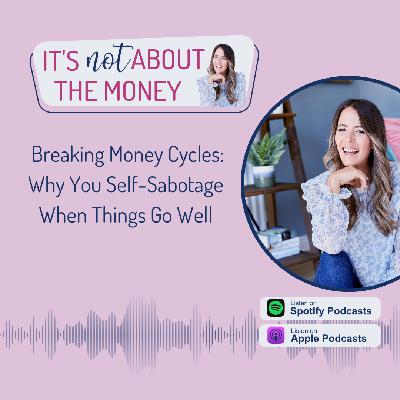
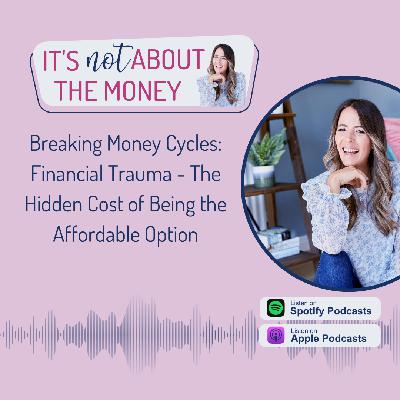
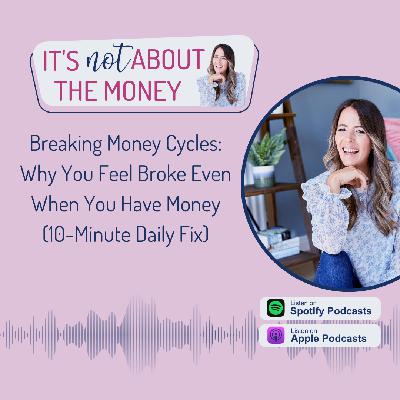
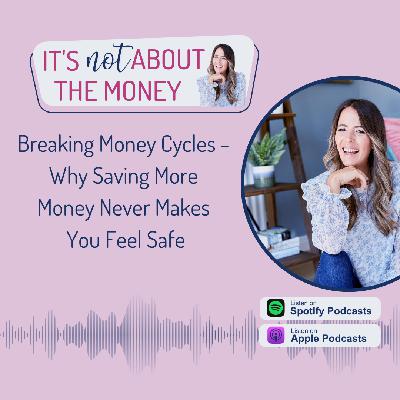
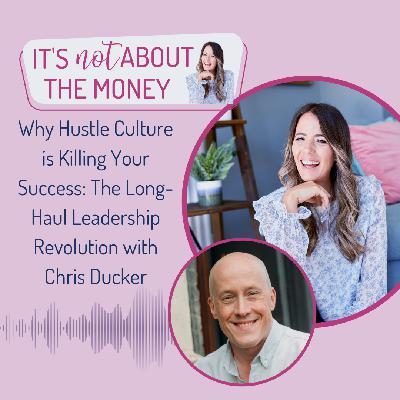
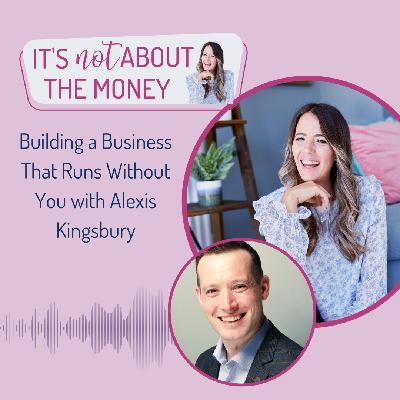
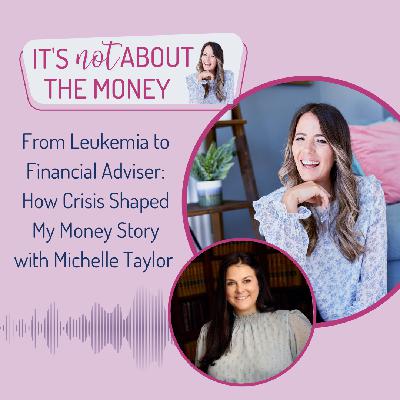
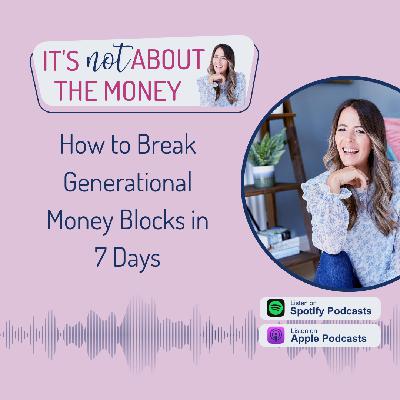
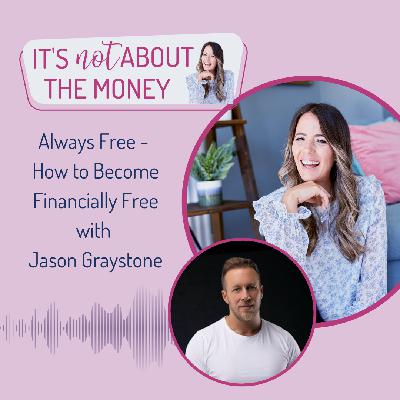
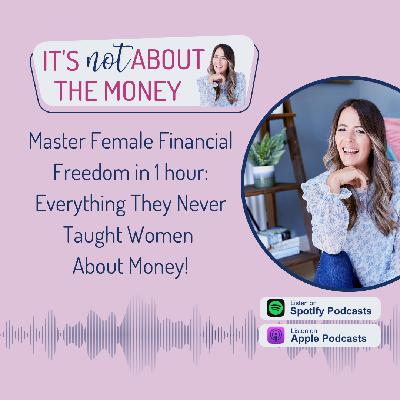

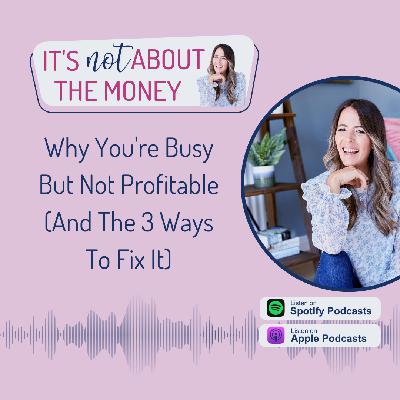

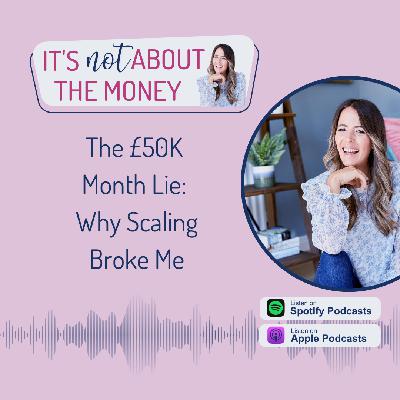
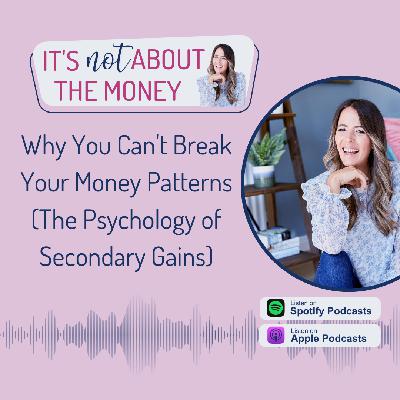
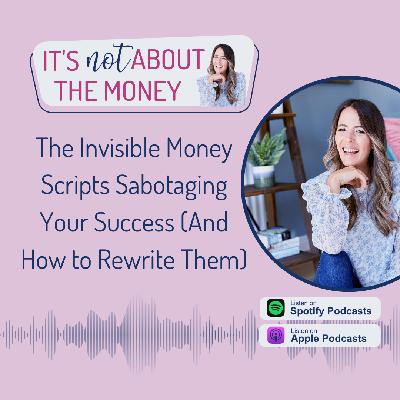
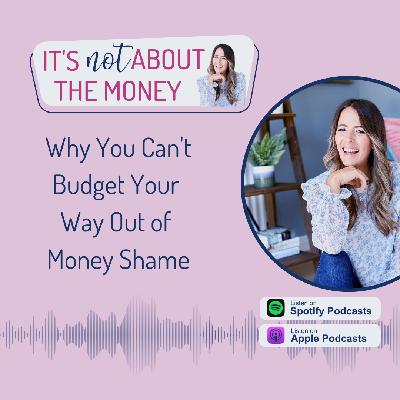
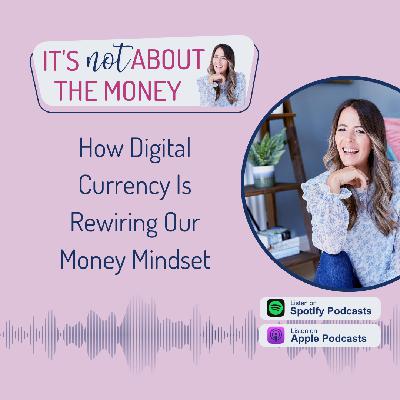
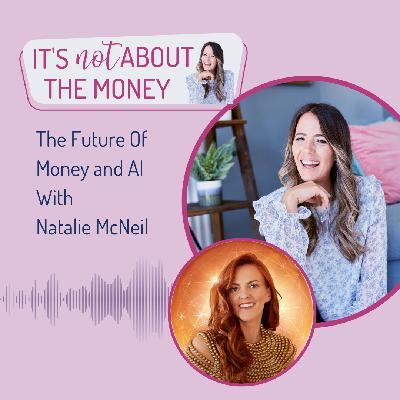
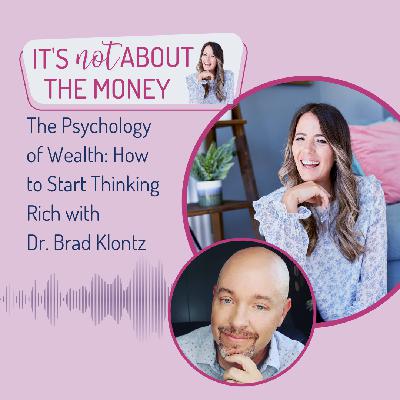



💖💖💖💖
This is my favourite podcast I listen to it when I'm having some 'me time'. Catherine has an great conversational style it's like catching up with a friend over coffee.. So down to earth, amazing tips and I find myself nodding along to her advice and suggestions. I love the guest speakers it's great to hear their stories, their successes and the range of topics that are covered. Love it. Thank you so much Catherine I've gone from someone who lived in my overdraft and had zero savings to having sinking funds, emergency funds and over paying my mortgage... I am no longer scared or ashamed about money x
Catherine Morgan is my hero and saviour of all things financial, living a good positive life and women supporting women! These podcasts are so great and her groups and challenges are amazing. You must do yourself a favour and listen in!
Great podcast start to New Year! Love Catherine and her guests... empowering women!
Love Catherine Morgan's podcast... practical advice & inspiring guests, which has really helped me shift my money mindset and have greater focus on my money, goals, business.
I really wanted to like these podcasts, but I don't. The subjects are interesting in their own, but presented in the most boring way. Catherine is really awkward when she has guest "speakers" - boring questions, awkward acknowledgements.
Loving the podcasts, thank you Catherine for such inspiring info on a subject that like you say we don't like to talk about.. MONEY... Can't wait for the next instalment. I've already made a plan for saving expected and unexpected and to help repay those Debts... Feeling much more in control 👏👏